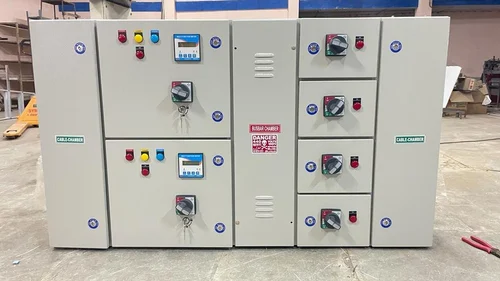Electrical Panel Installation in Bangalore

Contact : +91 96205 11529
Electrical Panel Installation
Electrical panel installation is a critical aspect of any electrical system, serving as the central point for power distribution throughout a building. Whether it's for a residential, commercial, or industrial setting, a properly installed electrical panel ensures the safe and efficient operation of all electrical circuits. This guide will provide an overview of electrical panel installation, its importance, and key considerations to keep in mind for optimal performance.
What is an Electrical Panel?
An electrical panel, also known as a distribution board, circuit breaker panel, or breaker box, is the heart of a building’s electrical system. It receives power from the utility company and distributes it to various circuits throughout the property. The panel houses circuit breakers or fuses that protect circuits from overloads, ensuring the safety of the building and its occupants.
Why is Electrical Panel Installation Important?
Proper electrical panel installation is crucial for ensuring safety, reliability, and longevity of an electrical system. A malfunctioning or improperly installed panel can lead to electrical fires, power surges, or equipment damage. The installation process must comply with local electrical codes and safety standards to ensure everything functions as it should.
Key Considerations for Electrical Panel Installation
-
Professional Installation: Electrical panel installation should always be carried out by a licensed electrician. Professional installation ensures the panel is properly sized, grounded, and wired to meet local electrical codes. An expert can also assess your home or business’s power requirements to select the appropriate panel for your needs.
-
Panel Size and Type: The size of the electrical panel depends on the amount of electrical load it needs to support. For smaller homes, a 100-amp panel might suffice, while larger homes or businesses may require 200-amp or higher-capacity panels. The type of panel you choose will also depend on whether you need a single-phase or three-phase system, typically determined by the scale of your operation or residential needs.
-
Proper Placement: The placement of your electrical panel is another critical consideration. It must be easily accessible for maintenance and emergency shut-offs. Panels are usually installed in basements, garages, or utility rooms. It’s essential to avoid placing the panel in damp or confined spaces where moisture or heat can pose a risk to the wiring.
-
Upgrading Your Panel: If you’re experiencing frequent circuit overloads, tripped breakers, or inadequate power supply, it may be time to upgrade your electrical panel. An upgrade ensures your panel can accommodate more circuits and higher electrical loads, particularly if you've added new appliances or equipment to your home or business.
-
Safety Features: Modern electrical panels come with several built-in safety features, such as surge protection, ground fault circuit interrupters (GFCIs), and arc fault circuit interrupters (AFCIs). These features help protect the electrical system and the people within the building from electrical hazards.
The Installation Process
The process of installing an electrical panel typically involves the following steps:
-
Preparation: The area where the panel will be installed is cleared, and the electrical supply is shut off to ensure safety.
-
Panel Mounting: The electrician mounts the panel on the wall, ensuring it is level and securely fastened.
-
Wiring and Circuit Connection: Wires are connected from the electrical meter to the panel, and each circuit is properly wired to its respective breaker.
-
Testing: Once the installation is complete, the system is tested to ensure proper functioning. The electrician will check for correct voltage levels and confirm the safety features are working as intended.
-
Final Inspection: A final inspection may be required by local authorities to ensure the installation meets code standards.
Conclusion
Electrical panel installation is a crucial component of any building’s electrical system. Whether you're constructing a new home, upgrading an existing panel, or building a commercial establishment, proper installation ensures the safe and efficient distribution of electricity. Always trust a licensed and experienced electrician for your electrical panel installation to ensure compliance with local codes and to guarantee a system that will serve you reliably for years to come.
By using this guide, you can better understand the importance of professional electrical panel installation and make informed decisions about your electrical needs.
.jpg)